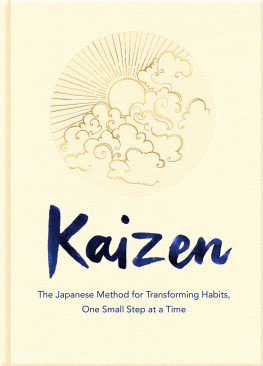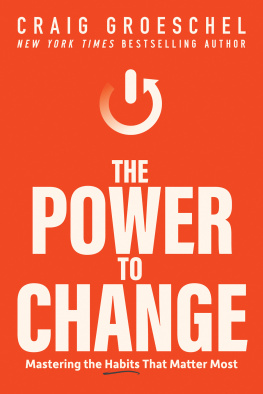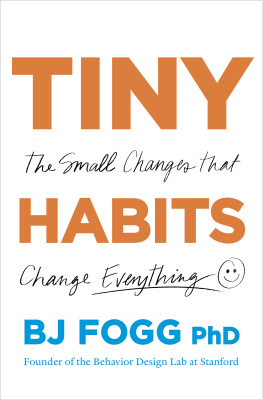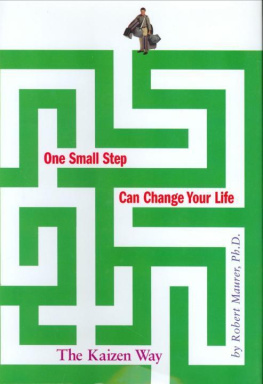Kaizen
The Japanese Method
for Transforming Habits,
One Small Step at a Time
SARAH HARVEY
CONTENTS
Guide
PROLOGUE
KAIZEN AND ME
In September 2017, I decided to quit my job working for a London publisher and move to Japan. I enjoyed my job and had a fun social life but was feeling burnt out and anxious. The political landscape was uncertain, and I was feeling increasingly out of control. I tried to do yoga and practise mindfulness as much as possible, but I found that it wasnt enough to combat the feelings of anxiety and instability I had about the future. I wanted to change some of my behaviours that I knew werent doing me any good but I found it difficult to keep up with any new habits. In short: I was tired, creatively uninspired and definitely needed a break from my routine.
As soon as I moved to Japan I noticed how, even when you were in a busy or built-up place, there was a sense of calm. The Tokyo Metro at rush hour was just as populated if not more so than the London Underground, but there would be no passive-aggressive jostling for space. You would be packed into carriages like sardines but it would be practically silent. The traffic was almost exclusively congested but nobody would beep their horns or drive erratically. You hardly ever saw anybody rushing; there was a sense of order and a slower pace. My new Japanese home was bigger and busier in places, but somehow less frantic and a far more welcoming, clean and relaxing space to be in. And from that, I felt encouraged to slow down, make some lifestyle changes and embrace new, more enriching and creative challenges. Taking a step into a different culture showed me some of the things I was getting wrong with my habits and routine in London, where I often rushed around on autopilot, and wasnt always looking after myself in the best way.
After living in Japan for six months and noticing these differences in my own behaviour, I became fascinated by how small details and incremental change were given more emphasis in Japanese daily life. If you saw a road being resurfaced, there would be a huge team working on it, each focusing on a very small task, whether that was measuring out the space, doing the digging or directing pedestrians around the footpath. Rather than the job taking weeks (or years!), the entire road would be back in action within a few days. I learned of sushi chefs who train for seven whole years, each part of the process taught meticulously. In my Japanese lessons, I was taught how important it is that the strokes of the Japanese script are performed in a certain order the kakijun and that it takes children almost the entirety of their compulsory education to learn the full set of 2,136 kanji characters. Small details matter in Japanese culture. I started researching this aspect of Japanese life and, through this, I discovered the philosophy and practice of Kaizen (Kyzen).
Roughly translating from Japanese into good change or improvement, the philosophy of Kaizen isnt about change for changes sake, but about identifying particular goals both short-term and long-term and then making small, manageable steps to achieve those goals. Rather than forcing us to make big dramatic changes, the method emphasizes doing things incrementally.
Kaizen uses the psychological teaching around why we find it hard to give up bad habits and stick to new challenges, and offers a clear structural framework for going about change. It is most commonly known as a business methodology, but it has clear benefits for your own personal development too. It can transform the way that you feel about yourself, your goals and your environment.
Learning about Kaizen made me think about the long history that we have of looking to others particularly in the East for wisdom about living well and with happiness. We are living in uncertain and stressful times and I dont think it is any coincidence that this has resulted in a recent flurry of interest in looking to other cultures and traditions for guidance. This can be seen in the trends for all things Scandinavian whether that is hygge, lagom, lykke or sisu or Japanese concepts, such as ikigai, wabi-sabi, kakeibo, kintsugi, shinrin-yoku, and Marie Kondos popular decluttering methods.
Having a change of scene and introducing new experiences into my life meant that I found it easier to break away from my previous routine. I started to take on some new, positive habits in the spirit of Kaizen. I felt inspired to write again and started doing morning yoga every day, an activity I had previously enjoyed but which I had allowed to lapse. Some of my habits changed through no choice of my own (it is very hard to find decent Cheddar cheese to gorge on in Tokyo!) but I also started to change things of my own volition. Being away from my usual temptations and triggers shone a light on where I was misstepping before, in both my personal and working life. I was now working as a freelancer and this illuminated many of the things that I had been getting wrong with my previous office-based working life. It also meant that I suddenly had to learn to be disciplined with time and not let work bleed into my evenings too much (although I often failed with this, I have to be honest!).
I am now back in London and there are a number of small changes I made during my time in Japan that have become fundamental to my daily life. I am more mindful of how my actions impact upon my physical and mental health, particularly how I need to slow down, say no to invitations, and take breaks from social media and the relentless news cycle. Japanese society is by no means a perfect one Japans gender gap was ranked at a miserable 114th out of 144 countries in 2017 But using my time in Japan as an opportunity to reflect, taking a step back from habits that had become second nature, and learning from another culture has made me think closely about the ways in which I was behaving before. It has transformed the way I go about my daily life. I feel far more creative, relaxed and focused.
Kaizen is useful for anybody wishing to change their routine. Rather than making any scary leaps into the dark, it is about stepping back and analysing your current habits, deciding what you could improve in your existing life, or thinking of new challenges you could start, then putting into place a plan to change in very small incremental stages. You will hardly even notice the difference to your routine. There are countless books that promise solutions to a happy life various daft fasting diets, eat clean people telling us to eat more coconut oil, and extreme exercise routines from nutty-chested former army cadets with twelve packs. Most people find that these solutions are far too extreme, their busy lives get in the way, and they find it a struggle to sustain these kinds of changes in the long term. Having consulted a number of psychologists who specialize in habitual behaviour, the consensus is that making incremental changes to your habits is the key to sustainable results.
My life is by no means flawless; I dont own a beautiful mansion overlooking a lake, and there are days where I realize I have only eaten beige food. But I am definitely becoming more mindful of my behaviour and habits, and slowly improving the areas of my life where I felt dissatisfied before. I am looking after myself better and feel more inspired to learn and achieve new things. Amending my behaviour with small actions has been transformative. And as my friends and family would attest, if I can do it, then you can too! I have consulted Kaizen practitioners, psychologists and inspiring people from my own life so that, over the following chapters, I can show how incremental change can have a huge transformative effect on you too.











